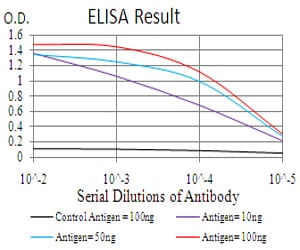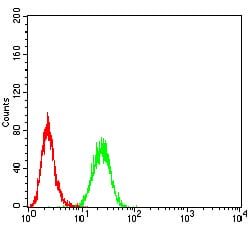

| WB | 咨询技术 | Human,Mouse,Rat |
| IF | 咨询技术 | Human,Mouse,Rat |
| IHC | 咨询技术 | Human,Mouse,Rat |
| ICC | 技术咨询 | Human,Mouse,Rat |
| FCM | 1/200 - 1/400 | Human,Mouse,Rat |
| Elisa | 1/10000 | Human,Mouse,Rat |
| Aliases | UV20; COFS4; RAD10 |
| Entrez GeneID | 2067 |
| clone | 1A5A2 |
| WB Predicted band size | 32.6kDa |
| Host/Isotype | Mouse IgG1 |
| Antibody Type | Primary antibody |
| Storage | Store at 4°C short term. Aliquot and store at -20°C long term. Avoid freeze/thaw cycles. |
| Species Reactivity | Human |
| Immunogen | Purified recombinant fragment of human ERCC1 (AA: 151-297) expressed in E. Coli. |
| Formulation | Purified antibody in PBS with 0.05% sodium azide |
+ +
以下是关于ERCC1抗体的3篇参考文献,按文献名称、作者和摘要内容简要列举:
---
1. **文献名称**:*ERCC1-Specific Antibodies to Predict the Prognosis of Platinum-Based Chemotherapy in Non-Small Cell Lung Cancer*
**作者**:Olaussen, K.A. et al.
**摘要内容**:该研究评估了ERCC1蛋白表达作为非小细胞肺癌患者接受铂类化疗预后的生物标志物。通过免疫组化(IHC)使用ERCC1抗体检测肿瘤组织,发现ERCC1低表达患者对铂类药物反应更佳,提示抗体检测可能指导个体化治疗。
---
2. **文献名称**:*Comparative Analysis of ERCC1 Antibody Performance in Formalin-Fixed Paraffin-Embedded Tissues*
**作者**:Friboulet, L. et al.
**摘要内容**:研究比较了多种市售ERCC1抗体在福尔马林固定石蜡包埋(FFPE)组织中的特异性和一致性。结果显示不同抗体间检测结果差异显著,强调标准化抗体验证和检测流程对临床研究的重要性。
---
3. **文献名称**:*ERCC1 Expression and Resistance to Platinum-Based Therapy: A Role for Antibody Validation in Predictive Biomarker Development*
**作者**:Bhagwat, N.R. et al.
**摘要内容**:该文献探讨了ERCC1抗体在预测卵巢癌患者铂类化疗耐药中的价值。通过Western blot和IHC分析,发现特定抗体(如8F1克隆)与DNA修复功能相关性更强,提示抗体选择直接影响生物标志物研究的可靠性。
---
4. **文献名称**:*Antibody-Based Detection of ERCC1 in Clinical Samples: Technical Challenges and Implications for Personalized Medicine*
**作者**:Vaezi, A. et al.
**摘要内容**:研究分析了ERCC1抗体在临床样本(如肺癌和头颈癌)中的技术挑战,包括抗原修复方法和抗体交叉反应性问题。提出多平台验证(如mRNA表达与蛋白检测结合)可提高结果准确性,支持其在个体化医疗中的应用。
---
以上文献均围绕ERCC1抗体的应用、验证及其在癌症治疗预测中的意义展开,涵盖技术评估和临床相关性分析。
ERCCl (Excision Repair Cross-Complementation Group 1) is a critical protein involved in DNA repair mechanisms, particularly in the nucleotide excision repair (NER) pathway. It forms a heterodimer with XPF (xeroderma pigmentosum group F) to cleave damaged DNA strands during repair processes, including the removal of platinum-based chemotherapy-induced DNA crosslinks. Due to its role in maintaining genomic stability, ERCCl expression has been studied as a potential biomarker for predicting patient responses to platinum-based therapies (e.g., cisplatin, oxaliplatin) in cancers such as non-small cell lung cancer, ovarian cancer, and colorectal cancer.
ERCCl antibodies are essential tools for detecting and quantifying ERCCl protein levels in clinical and research settings. Commonly used in immunohistochemistry (IHC) and Western blotting, these antibodies help assess ERCCl expression in tumor tissues, which may guide personalized treatment decisions. However, variability in antibody specificity, epitope recognition (e.g., clones 8F1. 4F9), and scoring methods has led to inconsistent clinical correlations across studies. For instance, while some trials associate low ERCCl levels with better chemotherapy outcomes, others report conflicting results, highlighting the need for standardized detection protocols.
Ongoing research aims to refine ERCCl antibody validation and explore its interactions with other DNA repair proteins. Additionally, emerging evidence suggests ERCCl's involvement beyond NER, including roles in telomere maintenance and resistance to targeted therapies, broadening its relevance in cancer biology and therapeutic strategy development.
×